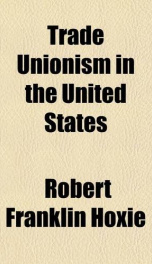trade unionism in the united states

Purchase of this book includes free trial access to www.million-books.com where you can read more than a million books for free. This is an OCR edition with typos. Excerpt from book: CHAPTER II GENERAL CHARACTER AND TYPES From the popular viewpoint, trade unionism is a simple, definite phenomenon upon which it is easy and safe to pass positive and sweeping judgments. Almost every one, in fact, who is at all interested in economic or social affairs is inclined to assume that he knows just about what unionism is, and just what ought to be done about it. The man in the street, the lawyer, the economist, the social worker, the teacher, the preacher, each has his positive concept and his positive scheme for union control or regeneration. Thus the student honestly seeking the truth about unionism is faced at the outset with a mass of confident but contradictory interpretations. He is told that union- ism is a narrow group organization designed to benefit ) certain favored workmen at the expense of all others; / that it is an artificial monopoly of labor, an impossible attempt to raise wages by unnatural and therefore socially inimical means; that it is the creation of selfish and unscrupulous leaders primarily for their personal gain and aggrandizement, a thing foisted upon unwilling workers and designed to disrupt the natural harmony of interests between employers and employees; that it is a mere business device for regulating wages and conditions of employment, by means of collective bargaining; that it is a great revolutionary movement, aiming ultimately to chapter{Section 4overthrow capitalism and our whole legal and moral code; that it is a universal expression of working class idealism whose purpose is to bring to all the toilers hope, dignity, enlightenment, and a reasonable standard of living; that it is, in short, selfish and altruistic, monopolistic and inclusive, artificial and natural, autocratic and democratic, violent and law-abiding, revolut...
Info about the book
Author:
Series:
Unknown
ASIN:
B00A1U7J94
Rating:
4/5 (3)Your rating:
0/5
Languge:
English
Users who have this book
Users who want this book
What readers are saying
What do you think? Write your own comment on this book!
write a commentGenre
if you like trade unionism in the united states try:
Other books by this author
Do you want to read a book that interests you? It’s EASY!
Create an account and send a request for reading to other users on the Webpage of the book!


